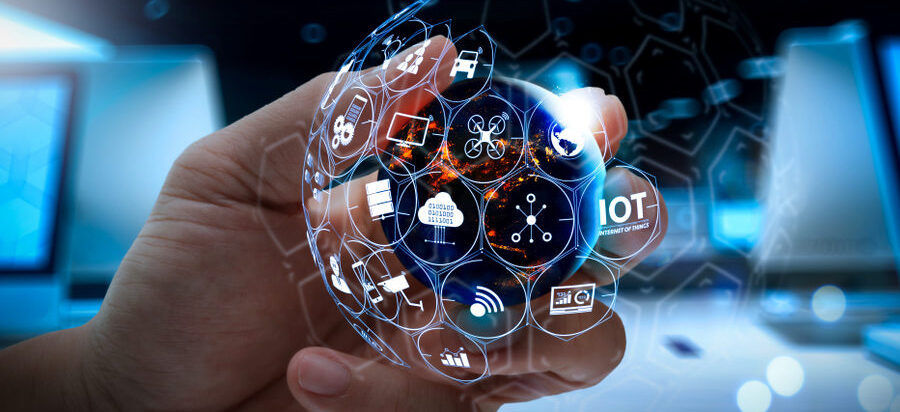Top Emerging Technologies Which Shape The Future of Web & Mobile App Development


The world of emerging technology is constantly evolving, and the emergence of new technologies is transforming the way we live, work, and interact with our environment. These innovations hold great promise for the future and are likely to have a profound impact on various aspects of our lives.
Artificial Intelligence, coupled with Machine Learning, continues to transform various industries. AI systems can analyze large datasets, recognize patterns, and make predictions or decisions without human intervention. In healthcare, AI is used for disease diagnosis, while in finance, it’s employed for fraud detection and algorithmic trading. The evolution of AI promises to revolutionize how we live and work, with autonomous vehicles, smart cities, and more on the horizon.
The Internet of Things is connecting everyday objects to the internet, allowing them to collect and exchange data. This technology is revolutionizing sectors like healthcare, agriculture, and manufacturing. IoT devices range from smart thermostats and wearable fitness trackers to industrial sensors that monitor machinery performance. With IoT, we’re seeing increased efficiency and the creation of new business models.
The rollout of 5G networks is ushering in a new era of connectivity. With faster data speeds, low latency, and increased capacity, 5G is enabling technologies such as augmented and virtual reality, autonomous vehicles, and telemedicine. It’s not just about faster smartphones; it’s about enabling a wide range of applications that were previously impractical.
Blockchain technology, originally developed for cryptocurrencies like Bitcoin, is finding applications far beyond digital currencies. Its decentralized and secure nature makes it suitable for various industries, such as supply chain management, voting systems, and healthcare data management. Blockchain is becoming a fundamental tool for increasing transparency and security in data transactions.
Quantum computing is still in its infancy, but its potential is staggering. Unlike classical computers, which use bits to represent information, quantum computers use qubits. This allows them to perform complex calculations at speeds that are currently inconceivable. Quantum computing could revolutionize fields like cryptography, drug discovery, and climate modeling.
Biotechnology is advancing at a rapid pace, with CRISPR-Cas9 gene editing and mRNA vaccine technology making headlines. In genomics, the ability to sequence an individual’s DNA at a reasonable cost has opened up new possibilities for personalized medicine and disease prevention. These innovations are revolutionizing healthcare and the biopharmaceutical industry.
Augmented and virtual reality technologies are reshaping how we interact with digital information. They have applications in gaming, education, healthcare, and even remote work. AR enhances the real world with digital elements, while VR immerses users in entirely virtual environments. As these technologies become more accessible, their impact on various industries will grow.
As concerns about climate change intensify, the development of green and renewable energy sources is a top priority. Technologies like solar panels, wind turbines, and energy storage systems are becoming more efficient and cost-effective. They offer the promise of reducing our reliance on fossil fuels and mitigating the effects of climate change.
Advances in robotics and automation are transforming industries such as manufacturing, logistics, and healthcare. Robots are becoming more versatile, capable of tasks ranging from warehouse picking to assisting in surgeries. These technologies improve efficiency, reduce costs, and can handle tasks in environments dangerous to humans.
Space exploration is experiencing a renaissance, with the growth of commercial spaceflight and ambitious missions to the Moon and Mars. Technologies related to rocket propulsion, space habitats, and resource utilization in space are rapidly advancing. The dream of colonizing other planets is becoming closer to reality.
These emerging technologies are not only fascinating but also have the potential to reshape our world. Keeping up with these trends and understanding their implications is essential for individuals and businesses looking to stay at the forefront of innovation and progress
Conclusion:
From Artificial Intelligence and Machine Learning, which are revolutionizing data analysis and decision-making, to the Internet of Things that is connecting everyday objects, to 5G technology that is redefining connectivity, each of these technologies offers unique opportunities and challenges.
Blockchain is changing the way we manage and secure data, while Quantum Computing is poised to tackle complex problems that were previously unsolvable. In the field of biotechnology and genomics, we’re witnessing breakthroughs that have the potential to revolutionize healthcare and genetics.
Augmented and Virtual Reality are changing how we perceive and interact with the digital world, and green and renewable energy sources are addressing critical environmental concerns. Robotics and automation are improving efficiency and safety in various industries, and the renewed interest in space exploration is expanding our horizons.
Staying informed about these emerging technologies is crucial, as they open up new possibilities for businesses, individuals, and society as a whole. Adapting to these changes, harnessing their potential, and addressing the challenges they bring are the keys to staying at the forefront of innovation and shaping a better future.
As these technologies continue to develop and integrate into our daily lives, we can expect to see even more profound changes in the years to come. Embracing these changes with knowledge and a forward-looking mindset is the path to success and progress in our ever-evolving world.
